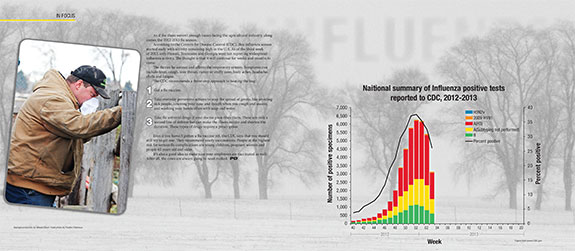As if there weren’t enough issues facing the agricultural industry, alongcomes the 2012-2013 flu season.
According to the Centers for Disease Control (CDC), this influenza seasonstarted early with activity remaining high in the U.S. As of the third weekof 2013, only Hawaii, Tennessee and Georgia were not reporting widespreadinfluenza activity. The thought is that it will continue for weeks and months tocome.
The flu can be serious and affects the respiratory system. Symptoms caninclude fever, cough, sore throat, runny or stuffy nose, body aches, headache,chills and fatigue.
The CDC recommends a three-step approach to beating the bug:
- Get a flu vaccine.
- Take everyday preventive actions to stop the spread of germs, like avoidingsick people, covering your nose and mouth when you cough and sneeze,and washing your hands often with soap and water.
- Take flu antiviral drugs if your doctor prescribes them. These are only asecond line of defense but can make the illness milder and shorten theduration. These types of drugs require a prescription.
Even if you haven’t gotten a flu vaccine yet, the CDC says that you shouldstill try to get one. They recommend yearly vaccinations. People at the highestrisk for serious flu complications are young children, pregnant women andpeople 65 years old and older.
It’s also a good idea to make sure your employees are vaccinated as well.
After all, the cows are always going to need milked.
Click here or on the image to see a graph showing the national summary of influenze positive tests. PD






